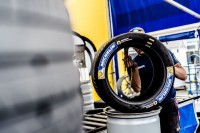Yokohama Rubber reports on joint rubber research
The results of joint research projects undertaken between Yokohama Rubber and two universities in Thailand since 2013 were announced at The International Polymer Conference of Thailand 2018 (PCT-8) in June. The joint research projects were conducted with researchers at Mahidol University and Prince of Songkla University and focused upon ensuring stable, reliable supplies of natural rubber.
The research with Mahidol University succeeded in analysing proteins contained in latex from the Hevea brasiliensis, or Pará rubber tree, the base raw material for natural rubber, and identifying the proteins deeply involved in natural rubber biosynthesis. Yokohama Rubber says the research deepens the understanding of the biosynthesis of natural rubber, making it possible to accelerate research related to quality and production.
As natural rubber production is concentrated in just one part of the world, Southeast Asia, crops are exposed to weather and disease risks. Expecting global demand for tyres to increase in future, Yokohama Rubber considers it an “important corporate duty” to undertake measures that improve the quality of natural rubber and also the stability of its production. The company plans to use the results of its joint research with the universities to promote the maintenance and development of natural rubber plantations.
The research conducted at Mahidol University entailed the extraction and nano-level analysis of proteins from fresh latex and seedlings from Pará rubber trees. The analysis covered more than 800 kinds of proteins contained in latex, some of which were found to be related to natural rubber biosynthesis and stress resistance. In addition, by comparing proteins from different varieties of Para rubber trees, the researchers were able to identify the proteins that promote biosynthesis and the proteins that inhibit biosynthesis. The proteins are expected to be used as biomarkers of biosynthesis.
The research at Prince of Songkla University was fundamental research on natural rubber that focused on analysing the differences in latex related to different seasons and regions, different varieties and different processing methods. The research also evaluated the presence or absence of changes in the physical and chemical properties of rubber over long periods of time. To date, natural rubber has been a very stable material, from its composition to its physical properties, and it has been highly resistant to external factors.
The Yokohama Rubber Group has positioned “Promotion of CSR activities throughout the value chain” as one of the important issues of the Group’s corporate social responsibility (CSR) activities. Accordingly, in addition to the above joint research projects on natural rubber, the Group is engaged in activities that will contribute to sustaining farmlands. These activities have included biodiversity surveys on natural rubber plantations and promoting widespread use of an “agroforestry farming method” that contributes to more stable income for rubber tree growers by planting bamboo, fruit trees and other plants in natural rubber forests.
Mahidol University is a national university with its main campus in Bangkok. It is Thailand’s top ranked university and has demonstrated particularly strong leadership in the field of natural rubber research. Prince of Songkla University is the oldest national university in southern Thailand, where the cultivation of natural rubber is thriving. Y.T. Rubber Co., Ltd., the Yokohama Rubber Group’s natural rubber processing company in Thailand, is located in Thailand’s Surat Thani Province, which is also home to the Prince of Songkla University campus where the joint research was conducted.




Comments